In Croatia Is Blowing a Wind of Change
Adelina Marini, January 5, 2015
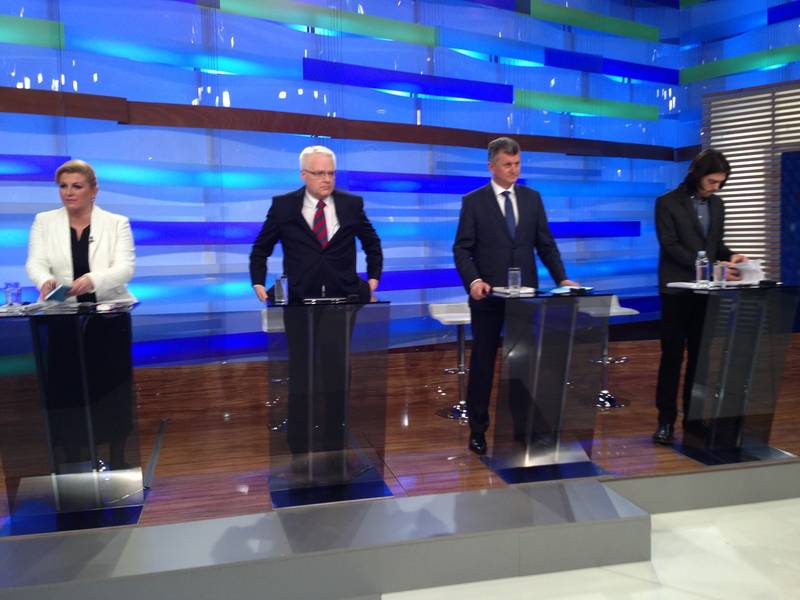 The presidential elections in Croatia in the end of 2014 have offered several surprises and lots of food for analyses and thought. The biggest surprise is that, in fact, the big winner in the first round, that took place on 28 December, is the youngest candidate in the country's history the 25-year old Ivan Vilibor Sincic. He succeeded to refute all the predictions by receiving the confidence of 16.42% of the votes and that he did with a very humble amount of money. In his own words, he spent for the campaign some 25 000 kunas (circa 4 000 euros) in cash and 80 000 kunas in the form of various services. In other words, the overall amount is 100 000 kunas (14 000 euros). Another surprise is that the candidate of the right-wing opposition Croatian Democratic Union (HDZ), which in the past 2 years has been slowly creeping toward the far right, Kolinda Grabar-Kitarovic received almost the same number of votes as the incumbent head of state Ivo Josipovic. For her voted 37.22% and for Mr Josipovic 38.46%. For the first time in Croatia's modern history the race is so close. However, nothing behind these data is as simple as it might seem.
The presidential elections in Croatia in the end of 2014 have offered several surprises and lots of food for analyses and thought. The biggest surprise is that, in fact, the big winner in the first round, that took place on 28 December, is the youngest candidate in the country's history the 25-year old Ivan Vilibor Sincic. He succeeded to refute all the predictions by receiving the confidence of 16.42% of the votes and that he did with a very humble amount of money. In his own words, he spent for the campaign some 25 000 kunas (circa 4 000 euros) in cash and 80 000 kunas in the form of various services. In other words, the overall amount is 100 000 kunas (14 000 euros). Another surprise is that the candidate of the right-wing opposition Croatian Democratic Union (HDZ), which in the past 2 years has been slowly creeping toward the far right, Kolinda Grabar-Kitarovic received almost the same number of votes as the incumbent head of state Ivo Josipovic. For her voted 37.22% and for Mr Josipovic 38.46%. For the first time in Croatia's modern history the race is so close. However, nothing behind these data is as simple as it might seem.
A large part of the voters want the country to move on to the next level of democratic development. Another, as big a part, wants no change at all apart from more conservatism and has sympathies for the far right. A third group has emerged which surprised everyone in Croatia - of people who want to break up with the status quo and an entirely new path. And all this was brought together in only 47% voter turnout. Despite the appearance of new political stars, almost 53% of the voters did not find a reason in voting. Is this due to the very limited powers of the Croatian president (the head of state does not even have a veto power), the strong snow storms or simply the lack of a sufficiently attractive political option is not quite clear at this stage but it confirms the trend from the European elections in 2013 and 2014 when low turnout records were set.
Croatia is ripe for a change but what change?
2014 was a landmark year for Croatia. It broke the illusions that the economic crisis in the country is something temporary that will pass on once the economic situation in the euro area improves a bit but is a systemic problem. That is why the economic issues were central in the election campaign. 2014 has also revealed the growing need of direct democracy and that is thanks to ... the EU. This is the reason why three out of the four presidential candidates campaigned for a second Croatian republic. The candidates can be described in the simplest way as two firm right-wingers, one liberal and one anti-systemist.
The Croatian Beppe Grillo or Alexis Tsipras?
Ivan Vilibor Sincic's appearance on the political stage and the huge support for him is the result of the prolonged recession of the Croatian economy. Last year, the sixth in a row, the IMF said about Croatia that it is in an "unusually long recession". The perspectives for 2015 are not quite encouraging, although the European Commission expects in its autumn forecast an exit although the projected growth is pretty symbolic. An exit was projected for last year too and for the year before last. In Italy, Beppe Grillo has emerged thanks to the persistent inability of the political status quo to produce the needed change as in the status quo is included the EU and the euro area in particular. Grillo's Five Star Movement is undoubtedly a eurosceptic one. In this sense, Sincic is different to Grillo, but only at first sight because Croatia is eurosceptic by nature.
The support for the EU was, to put it mildly, unconvincing at the referendum on the country's EU accession. The attitudes have remained almost the same since then. For now, the accusations to the EU as such that it is the main reason for the Croatian economic woes are just a few unlike Italy or Greece, but the love for the Union is not as big as it used to be in Italy, Greece or in Bulgaria for that matter. Ivan Vilibor Sincic is an anti-system player. He fights against everything and everyone, but most of all he stands for a monetary sovereignty. This is the axis which his platform [in Croatian] circled around but not at all in the past tense. He was determined after election day to use the confidence he received for the parliamentary elections later this year because the parliament is the place where he can realise his ideas. He refused to support the candidates who remained for the second round on 11 January - Kolinda Grabar-Kitarovic and Ivo Josipovic.
And although he did not completely rule out the possibility of a future coalition with any of the existing parties for or after the Sabor elections in the end of the year, he clearly stated that he would not work with anyone who does not support his demand for monetary sovereignty. In his programme, Mr Sincic says that in 1994 Croatia lost its "most important sovereignty" which is the control over money. This happened with the Maastricht treaty which deprived Croatia of its most important monetary instrument - the primary issue of money. Since the introduction of the Croatian national currency (kuna), money has been created only in private banks, the so called secondary issue, through credit. This, he says, "is nothing but a hostile occupation". "What has not been done with weapons will be done with another thing - the corporations and banks will take over our territory, our resources and goods and will deprive our people of rights and private property", the platform says. That is why he campaigns for "deprivatisation" of money which means to use the mechanisms of the state and the Croatian People's Bank (HNB) to create money.
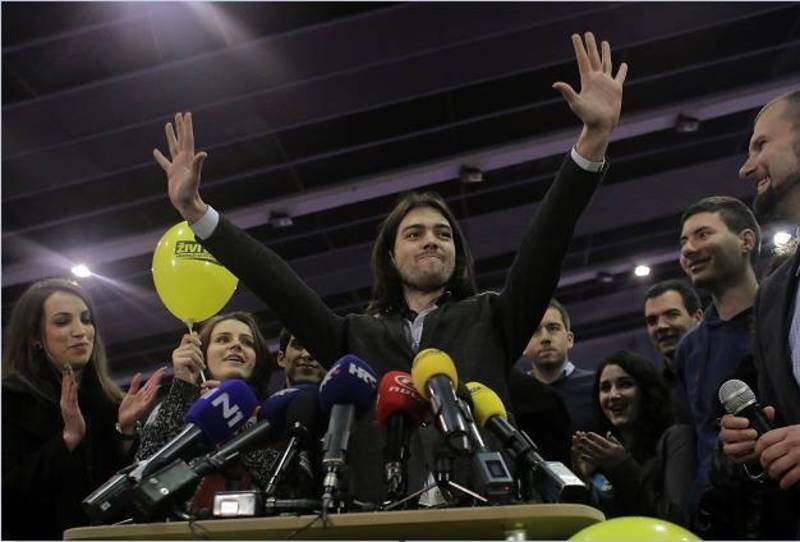 The link Sincic makes with the Maastricht treaty is odd as the treaty is adopted in 1992 and with it are established the fiscal rules that lay the foundations of the common currency. The treaty is valid for EU member states only. At the time, Croatia was not a member of the EU nor was it negotiating for accession.
The link Sincic makes with the Maastricht treaty is odd as the treaty is adopted in 1992 and with it are established the fiscal rules that lay the foundations of the common currency. The treaty is valid for EU member states only. At the time, Croatia was not a member of the EU nor was it negotiating for accession.
Another important aspect in Sincic's programme is the creation of a second republic because, in his words, Croatia has not become what "we wanted". Apart from the monetary sovereignty, a lustration should also be conducted so that those who worked for the previous two-party regime and the communist regime are removed from important positions. "We must stop giving power to the criminals and the people without vision", he says. The biggest opposition party in Croatia, HDZ, also demands lustration, but that party is rather a part of the problem because it led Croatia through its independence from former Yugoslavia and is responsible for the laying of the foundations of the young democracy.
Ivan Sincic's desire for monetary sovereignty is easy to explain given his short career. He is an activist from the movement Live Wall that fights against foreclosures. He has the ambition to make a revision of all the privatisation contracts from the early days of the independence because, according to him, the privatisation was a national robbery.
Similar to other populist and anti-systemic parties in the EU, Ivan Vilibor Sincic seems a probable ally to Vladimir Putin because he has clear anti-US views. From his election platform it is clear that USA is the biggest "war industry" and it dominates in NATO which Croatia is a member of. The investments of the American state in the military-industrial complex are growing every year as the trend started in the beginning of World War II. The process culminated in the end of the Cold War, the platform says. "If USA is not at war it cannot survive economically and will drag the entire world down with itself. US demands everyone to follow its investments and development model. From the above said it is completely clear that USA, with its economy and foreign policy, is a permanent generator of war, instability and people's miseries in the world". And as NATO is just an extension of "the hand of the American imperialism", Croatia should give up its membership in the organisation, Vilibor Sincic believes.
According to the Croatian legislation, each candidate gets a subsidy depending on the received number of votes. Because of his good performance Vilibor Sincic, too, received public money. He said he will use it to prepare for the parliamentary elections. Currently, the big dilemma is whether he will succeed to repeat or even multiply his success from the presidential elections or will sink in oblivion. This will depend very much on the reaction of the mainstream parties and some brand new political forces. After the end of the elections day the two strongest candidates - Grabar-Kitarovic and Josipovic - said they got the message. Ms Grabar-Kitarovic congratulated Vilibor Sincic in her speech and said that his victory clearly showed the need of a change. Ivo Josipovic was more contained, saying that Sincic's result is a clear signal to the political status quo.
2014 marked the stable upsurge of a new political party in Croatia - ORaH (Sustainable Development of Croatia) of Mirela Holy, the former minister of environment. Although her party has a clear green profile, the strong support for her can be explained precisely with the Croats' desire for something new they can trust. At the elections for the European Parliament she managed to send one MEP to Strasbourg. The opinion polls ranked Mirela Holy second after the current president Ivo Josipovic and her party was ranked second, too, ahead of Zoran Milanovic's Social Democrats. However, she decided to stay out of the presidential elections and supported Mr Josipovic instead. According to some analysts, this could prove a big mistake after Sincic's rise as he is firmly against everyone.
If Sincic succeeds to repeat his success in the end of the year, this will be a very bad news for the Croatian economy because it will mean that the country will enter a period of political instability. This, however, could be a good news for Putin who might get influence in another Balkan state (after Serbia). The big difference is that Croatia is a producer of oil and natural gas and is desperately trying to avoid Gazprom's appetites to put a hand over the searches for gas and oil in the Adriatic sea.
Kolinda is not Marine le Pen but could be
The former foreign minister in Ivo Sanader's government, Kolinda Grabar-Kitarovic, who then became an assistant to the NATO secretary general, is the candidate of HDZ. Out of the four presidential candidates she and Milan Kujundzic are the only purely party candidates. Vilibor Sincic is independent and is yet to found a party on the basis of the Live Wall movement, while Ivo Josipovic is supported by a coalition of 17 parties, including the Social Democrats whom he distanced himself from during his first term. That is why the result for Kolinda Grabar-Kitarovic should be viewed as a result for HDZ than her own achievement. It is this peculiarity which caused intense debates in Croatia regarding the trustworthiness of the opinion polls because the results from the first round showed a big deviation 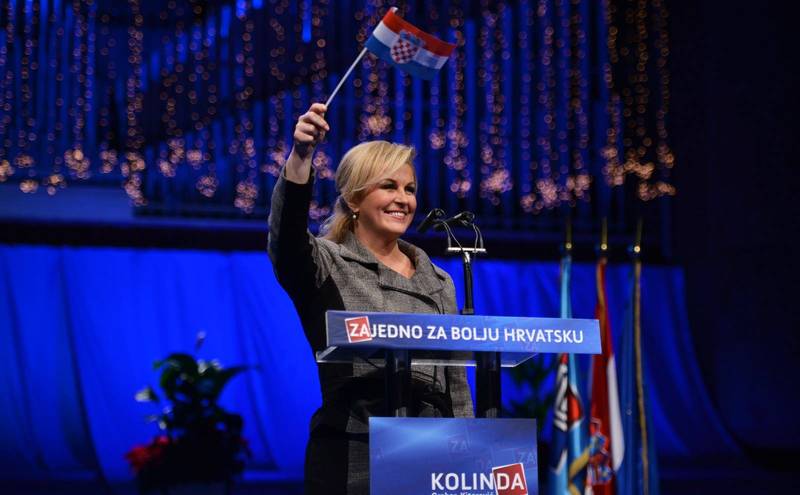 from the forecasts that gave Mr Josipovic an advance of almost 10 percentage points and even a victory in the first round.
from the forecasts that gave Mr Josipovic an advance of almost 10 percentage points and even a victory in the first round.
Instead, the two ended up with practically equal score because the difference between them is just a little over 1 percentage point. Kolinda Grabar-Kitarovic's biography suggests that she should rather have liberal views instead of supporting nationalism and at times radical far-rightism. According to the biography she sent to one of the most circulated newspapers in the country, Vecernji list, Kolinda Grabar-Kitarovic was a victim of prejudices and xenophobia for being a representative of a rare minority in the country with a specific dialect. Something that is familiar as a phenomenon in Bulgaria as well - people to be underestimated only because of the dialect they speak. She finished high school in the US where, in her own words, she found freedom and tolerance. She was indignant by the deep conservatism in the universities in Croatia at the time when she studied but nevertheless she agreed to be a candidate of HDZ which, under the leadership of the former home affairs minister and ex-chief of the counter-intelligence Tomislav Karamarko, turned into a nationalistic, conservative party, with strong attachment to the Church and with a growing cult to the personality of Croatia's first President Franjo Tudjman.
And although she states that she will be a president of all Croats, no matter if they are left or right, Kolinda Grabar-Kitarovic's election platform [in Croatian] reveals some worrisome trends. The first is that she relies very strongly on the veterans from the independence war and invites former generals in her team of advisers. This is a very indicative move at a time when the tension has again started to grow in the region because of Vojislav Seselj's return at the Serbian political stage and the refusal of the Serbian leaders to denounce him and his militaristic and xenophobic statements and provocations. In support of this trend is the decision of the HDZ election team Kolinda Grabar-Kitarovic to meet 2015 in the headquarters of the protesting veterans in Zagreb who want the resignation of the minister of veterans because of a statement of his last year.
The programme of the HDZ candidate very clearly mentions Franjo Tudjman as a foundation of the Croatian statehood and says: "The Croatian veterans were, are and will be a basis of the modern and sovereign Croatian state and system of national security". There can hardly be worse timing for such a doctrine, especially after a period when Croatia has been pointed as an example of successful European integration in the sense of EU's transformative power.
The second trend is related to Bosnia and Herzegovina which received a major European boost in the end of last year thanks precisely to Croatia. The country has been in a deadlock for years and had no progress in its European integration which was met coldly and with criticism by the EU. The Union acted as if it had nothing to do with Dayton Bosnia and Herzegovina. The initiative of the Croatian diplomacy under the leadership of first Deputy Prime Minster and Minister of Foreign Affairs Vesna Pusic (a liberal) BiH to receive EU's special attention has positioned Croatia as a constructive and active player in the European foreign policy in the region. Kolinda Grabar-Kitarovic's election programme, however, makes it clear that this policy will significantly change if she is to be elected.
To her the most important priority is "the protection of the Croatian people in BiH. I see BiH as a state with three equal constitutional peoples: Bosniaks, Serbs and Croats and the other minorities". Ms Grabar-Kitarovic believes that BiH needs constitutional changes that can ensure the equality of the three peoples. This practically means a renegotiation of the current structure of the state which consists of two entities - Republika Srpska and the Bosnia and Herzegovina Federation previously known as a Muslim-Croatian federation. HDZ has long promoted the Croats in BiH to have their own entity. The party maintains close relations with its sister party in BiH whose candidate won at the parliamentary elections in the autumn.
The relations between Croatia and Serbia will be a huge challenge for the EU as well this year, which is why it is very important what messages will official Zagreb be conveying. So far, there have been two occasions for reactions on sensitive issues. President Ivo Josipovic was refusing for a long time to meet the then newly elected president of Serbia Tomislav Nikolic because of his statement that Vukovar is a Serbian city. Nevertheless, in 2013 and the beginning of 2014 marked a serious warming of the relations between Zagreb and Belgrade. This has changed, however, with the Russian invasion in Ukraine and the annexation of the Crimea which led to a radicalisation of the rhetorics in Belgrade. On top of this, the international war crimes tribunal for former Yugoslavia in the Hague released temporarily, for health reasons, the former Serbian leader Vojislav Seselj.
The refusal of the Serbian authorities to openly condemn his statements and actions forced Croatia's Prime Minister Zoran Milanovic to cancel his participation in the big and now traditional summit between the countries from South-Eastern Europe with China in Belgrade. Croatia was represented at the summit by Deputy Prime Minister Vesna Pusic. The relations with Serbia are very delicate, especially in the current geopolitical period which is why every word weighs more than usual. In this regard, during the election campaign, responding to a question by journalists what relations with Serbia she will work for, Kolinda Grabar-Kitarovic made an odd statement. According to her, the Serbian minority in Croatia should take care for the good Serbian-Croatian relations (sic).
The HDZ election staff focused Kolinda Grabar-Kitarovic's campaign mainly on the country's economic woes in a way that showed that the party is preparing for the parliamentary elections and for nothing less than victory. In the programme of the candidate it is written that she intends to call extraordinary meetings of the government about the "devastating economic situation", about poverty, the national security, etc. It is also spoken of zero tolerance of corruption, the independence of the judiciary and openness and transparency of the institutions. This is, however, her weak spot which is skillfully 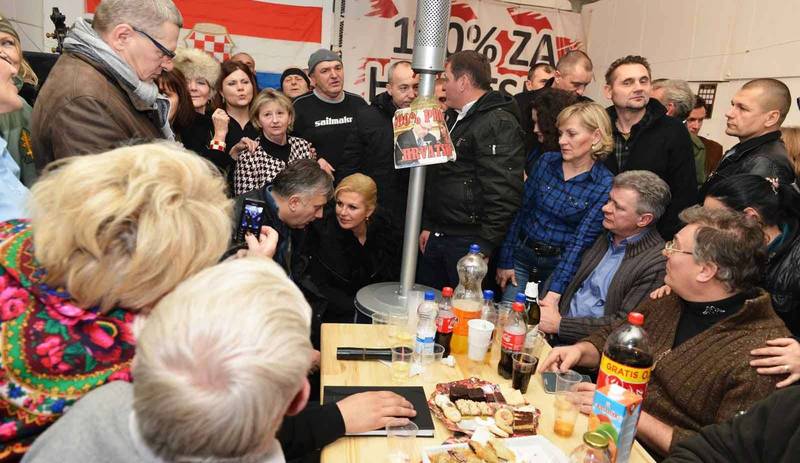 used by her opponent Ivo Josipovic and it seems that he will base his campaign for the second tour on that.
used by her opponent Ivo Josipovic and it seems that he will base his campaign for the second tour on that.
The problem with HDZ is that it is the first party sentenced for corruption (at first instance) which led to serious financial problems for the party at the European Parliament elections because the party accounts have been blocked. Besides, the party suffered severely from the fact that the first prime minister in the region, sentenced for corruption, abuse of power, war profiteering, is their former leader Ivo Sanader. There are other former ministers and officials from the party who were also sentenced sentenced. Grabar-Kitarovic's platform is huge and very detailed. A serious place there have typically European policies as if to balance the otherwise quite nationalistic priorities. In her interview in the end of the election day on 28 December, the HDZ candidate was asked whether she will be a pawn of HDZ. She firmly denied and said she would not be a puppet.
HDZ a paradox party. On the one hand, it is supported by all those who fought for Croatia's independence both from Yugoslavia and the communist dictatorship. This is the reason why this party still is, in spite of the huge corruption scandals, very influential. Because of the economic crisis, the party even managed to outrun the ruling coalition and is now leading the polls with a solid advantage. Nevertheless, its leader Tomislav Karamarko still is the most disliked politician in the country. Even the prime minister as a leader of a government that has failed in many of the expected reforms and the recovery of the economy performs better than Mr Karamarko. A paradox with purely historical roots.
Ivo Josipovic, the progressive liberal
The current head of state of Croatia is everything the EU leaders dream of - a true believer in the EU and its values, a liberal with progressive views about the future of his country in the EU. It is no accident that in the past years he was the most liked politician in the country with a huge advantage before everyone else. Apart from being a composer of classical music, Ivo Josipovic has a very good nose for the pains of society. 2014 offered him a great chance which he used to the maximum. In the summer, the association In the Name of Family, which is claimed to be sponsored by the Catholic Church in Croatia and has far-right and conservative views, launched a procedure of gathering signatures to initiate a referendum on amending the electoral acts in such a way to introduce in the parliamentary elections as well, as in the elections for the European Parliament, preferential voting.
This was not the only demand of the association, but it is the one President Josipovic embraced the most. He supported the idea and thus forced the two biggest parties in the parliament to amend the electoral act to introduce preferential voting. But he did not stop there. He put the constitutional changes at the centre of his election campaign [in Croatian]. He promotes a new Constitution that will lay the foundations of a second republic. This includes a new territorial structure that will ensure regionalisation and decentralisation; an upper level of democracy with a strong presence of direct democracy; stronger responsibility for state officials; broader and guaranteed in the Constitution protection of the human rights. Josipovic also wants internal party democracy to be enshrined in the Constitution, which is a huge challenge for the big mainstream parties.
Even before he officially presented his election platform, Ivo Josipovic initiated an opinion poll [in Croatian] of his own which shows a huge support for his ideas. One of them is the president to get a veto power which is supported by 86.9% of the respondents. A large part of them supports an idea which could be perceived as a populist one - ten thousand signatures to be enough the citizens to be able to put certain issues on the agenda of the parliament. His idea sentenced politicians and high level officials to be unable to continue their mandate and to resign also enjoys great support.
It is hard to speak without superlatives about Ivo Josipovic's programme. It is very balanced and well backed with arguments. Everything circles around the need of a political change as a starting point for economic recovery. "Without deep political changes, especially liberalisation of the electoral acts and new foundations for party organisation, it is not possible to conduct economic reforms", is the thesis of the 57-year-old former university professor in law. "In the political capitalism that has become comfortable in Croatia, there is no real possibility for the entry of new political forces and new people in 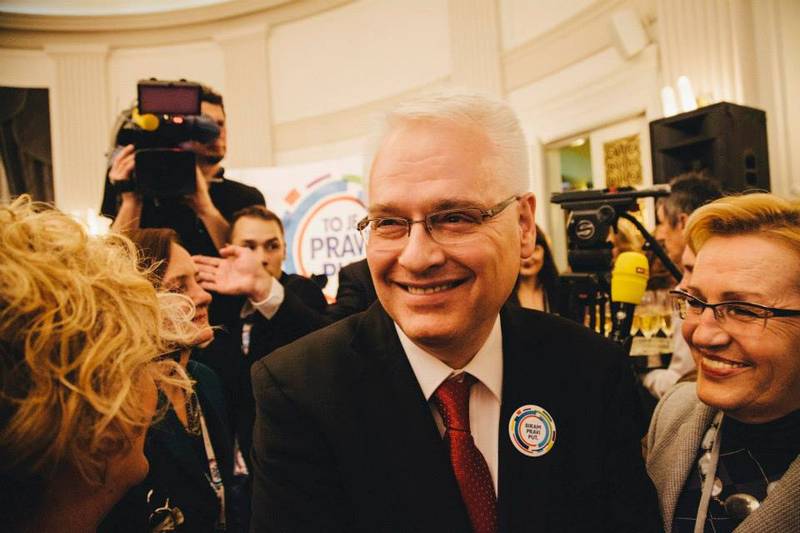 politics as well as a real possibility for competition of political ideas which are preconditions for societal and economic reforms", the programme says.
politics as well as a real possibility for competition of political ideas which are preconditions for societal and economic reforms", the programme says.
Ivo Josipovic's weakest spot is precisely what his opponents use against him - why now since he had five years to inspire change. His response is that during that time he accumulated experience. We should add here also the radical change in the global circumstances that have a direct impact on Croatia, too. Ivo Josipovic is cautious, modest and careful. He rarely makes mistakes. One of them, however, was the release of his adviser Dejan Jovic because of an article he published in a specialised scientific magazine about the democraticity of the first referendum in Croatia (on independence). This evoked sharp reactions by the nationalistic and far-right circles, including by HDZ. The article was published in the summer right before the beginning of the new political season. By keeping Jovic, Ivo Josipovic risked to turn the issue into a central topic of the election campaign.
And although his reaction is understandable, it reveals a serious problem with the freedom of expression which falls first a victim of political interests. Jovic's dismissal is a stain on the otherwise perfect reputation of Ivo Josipovic as a progressive liberal, especially when his opponents are the conservative and far-right forces who are turning Franjo Tudjman into an idol, thus preventing an objective analysis of Croatia's newest history on the grounds of which its future will be built.
Ivo Josipovic's foreign policy views overlap to a large extent with those of the current coalition government. What is new and different is that he believes that Croatia should support Macedonia so that it can make a decisive step forward to the EU. This is surprising given that Macedonia remains isolated in the enlargement process because of the unresolved name dispute and the Croatian diplomacy is generally passive on the issue of the former Yugoslav republic. Regarding Serbia, Ivo Josipovic avoids to speak about the direct relations with Croatia and focuses instead on the relations between Serbia and Kosovo as a precondition for progress.
There is no need of a new HDZ
The other big surprise in the presidential elections is Milan Kujundzic's failure. He was nominated by a coalition of parties. The gastroenterologist tried to take votes from HDZ with a very conservative and nationalistic programme [in Croatian]. The difference is, though, that in his programme, too, a major priority is the creation of a second republic as is with Ivo Josipovic and Ivan Vilibor Sincic. In the new Constitution, the doctor proposes to be enshrined that the foundations of the Croatian state are laid in the independence war. He also proposes the country to have a slogan in addition to the anthem and the crest. He also wants a radical change of the electoral system to introduce not only preferential voting but also a solid dose of majoritarian vote, a reduction of the threshold (5%) and conditions for direct democracy.
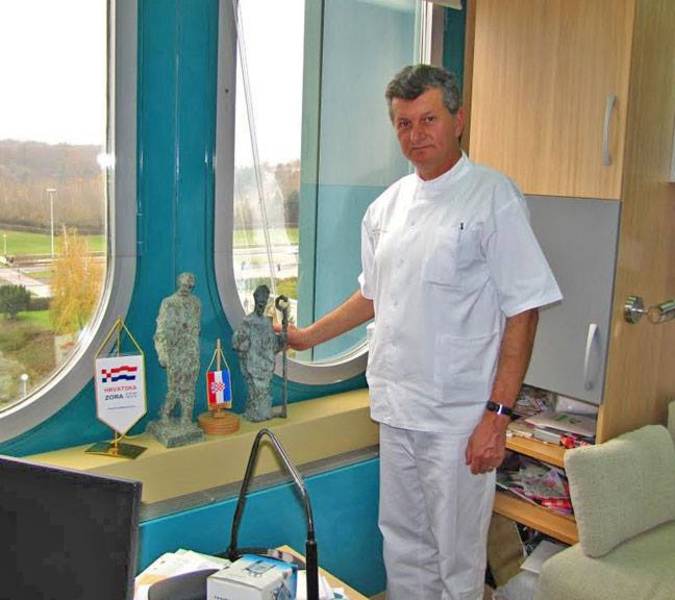 Kujundzic, as Sincic, wants lustration. However, he is of the opinion that the unresolved bilateral issues with Montenegro and Serbia should become preconditions for these two countries' membership in the EU which is entirely against the current views of the Union. Some analysts believe that HDZ and Kolinda Grabar-Kitarovic have reached the maximum score they can get and will hardly get more votes than those for Milan Kujundzic but this will not be enough to defeat Josipovic. Is this so we will see because the stakes are really high - is Croatia to become more conservative, will it turn to the past and will it radicalise or will it continue to liberalise and democratise?
Kujundzic, as Sincic, wants lustration. However, he is of the opinion that the unresolved bilateral issues with Montenegro and Serbia should become preconditions for these two countries' membership in the EU which is entirely against the current views of the Union. Some analysts believe that HDZ and Kolinda Grabar-Kitarovic have reached the maximum score they can get and will hardly get more votes than those for Milan Kujundzic but this will not be enough to defeat Josipovic. Is this so we will see because the stakes are really high - is Croatia to become more conservative, will it turn to the past and will it radicalise or will it continue to liberalise and democratise?
Everything will depend on the economy, of course, but what the example of Orban shows is that sometimes the economic growth has too high a political and society price - restriction of rights and liberties. That is why Croatia is facing a choice - more democracy or soft authoritarianism. This is a stake for the EU, too, because every change of the balance between the European liberalism and the supported by Russia nationalism and authoritarianism is a change of the EU's stability. Against the backdrop of an expected victory for Alexis Tsipras in Greece, the victory of populist and nationalistic forces in Croatia would be a huge blow for the European project.
 Kolinda Grabar-Kitarovic | © KGK
Kolinda Grabar-Kitarovic | © KGK Jozo Rados | © European Parliament
Jozo Rados | © European Parliament Aleksandar Vucic, Andrej Plenkovic | © Vlada RH
Aleksandar Vucic, Andrej Plenkovic | © Vlada RH